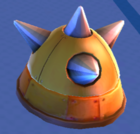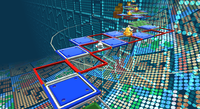Ring Beamer
- Not to be confused with Ring Burner.
| Ring Beamer | |||
|---|---|---|---|

| |||
| First appearance | Super Mario Galaxy (2007) | ||
| Latest appearance | Super Mario 3D All-Stars (2020) | ||
| |||
| |||
Ring Beamers,[1] also known as Pulse Beams,[2][3] are spiked yellow mechanical enemies that appear in Super Mario Galaxy and its sequel, Super Mario Galaxy 2. When Mario or Luigi approaches, they attack by emitting a circular shockwave that damages him if he touches it.
Ring Beamers are circular and yellow. Their heads are covered in spikes, making them hazardously surfaced in general.
History
Super Mario Galaxy
Ring Beamers first appear in Super Mario Galaxy, featuring in the Toy Time Galaxy and the Dreadnought Galaxy. They are stationary enemies that fire lasers in a circular shockwave formation, which will damage Mario or Luigi if he makes contact with them. They cannot be destroyed or stunned by any means.
Super Mario Galaxy 2

Ring Beamers reappear in Super Mario Galaxy 2, behaving identically to their first appearance, appearing in the Shiverburn Galaxy and the Grandmaster Galaxy. Unlike their debut appearance, this incarnation of them can be stopped by the Co-Star Luma, but not destroyed.
Names in other languages
| Language | Name | Meaning | Notes |
|---|---|---|---|
| Japanese | リングビーマー[4] Ringu Bīmā |
Ring Beamer | |
| German | Stachel-Laser[?] | Sting laser | |
| Spanish (NOE) | Robot Dispararrayos (Super Mario Galaxy) Anillo Láser(Super Mario Galaxy 2)[?] |
- |
References
- ^ Super Mario Galaxy / Super Mario Galaxy 2 internal filename (RingBeamer)
- ^ English Super Mario Galaxy entry on the official Mario portal. nintendo.co.jp. Retrieved August 13, 2022. (Archived August 12, 2022, 23:39:09 UTC via archive.today.)
- ^ English Super Mario Galaxy 2 entry on the official Mario portal. nintendo.co.jp. Retrieved August 13, 2022. (Archived August 12, 2022, 23:39:46 UTC via archive.today.)
- ^ Shogakukan. 2015. Super Mario Bros. Hyakka: Nintendo Kōshiki Guidebook, pages 128 and 161.